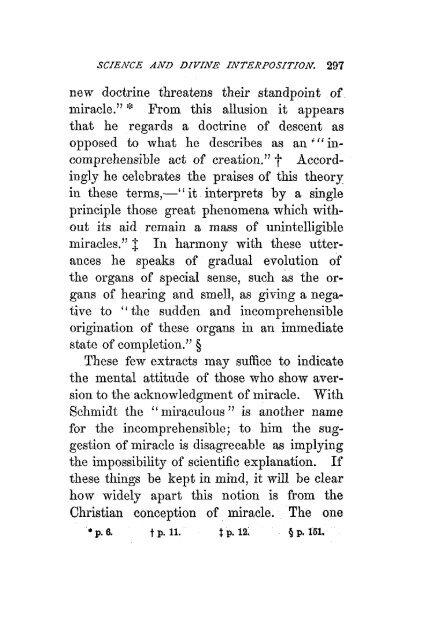The Relation of Science and Religion.pdf - Online Christian Library
The Relation of Science and Religion.pdf - Online Christian Library The Relation of Science and Religion.pdf - Online Christian Library
SCIENCE AND DIVINE INTERPOSITION. 297new doctrine threatens their standpoint ofmiracle." * From this allusion it appearsthat he regards a doctrine of descent asopposed to what he describes as an '"incomprehensibleact of creation." -j- Accordinglyhe celebrates the praises of this theoryin tl~ese terms,--"it interprets by a singleprinciple those great phenomena which withoutits aid remain a mass of unintelligiblemiracles." f In harmony with these utteranceshe speaks of gradual evolution ofthe organs of special sense, such as the organsof hearing and smell, as giving a negativeto " the sudden and incomprehensibleorigination of these organs in an immediatestate of completion."These few extracts may suffice to indicatethe mental attitude of those who show aversionto the acknowledgment of miracle. WithSchmidt the " miraculous " is another namefor the incomprehensible; to him the sug-gestion of miracle is disagreeable as implyingthe impossibility of scientific explanation. Ifthese things be kept in mind, it will be clearhow widely apart this notion is from theChristian conception of miracle. The one* p. 6. t p. 11. 3 p. 12. Q p. 151.
298 SCIZNCE AND RELIGION.view is that observational science can make noaccount of miracle: the other is that thoughtconcerning a supernatural Being really involve&the conception of miracle. Sciencecan assign no place to the incomprehensible,can make no account of it. Religion finds ahigher sphere of comprehensibility in theaction of supernatural power. The two positionsare radically distinct, and do not comeinto actual conflict. Hence religion has noopposition to the view of miracle just stated,which amounts to little more than a negativede.finition of science. To say that sciencecan take no account of the miraculous, isonly in other words to say that science is explanationof natural phenomena by recognitionof the action of natural causes, consequently the miraculous does not come withinthe boundaries of science. This is self-evident,and on this footing theology has no accountto make of what is only a semblanceof opposition, involving no real conflict. Creation,for example, can not come within thecompass of observational science; but creationmay nevertheless be a rational conceptionin dealing with a purely rational problem,which does not at all belong to physical sci-
- Page 268 and 269: MAN'S PLACE IN THE WORLD. 247tincti
- Page 270 and 271: MAN'S PLACE IN THE WORLD. 249It mus
- Page 272 and 273: MAN'S PLACE IN ?"l% WORLD. 251munic
- Page 274 and 275: M.-llV'S PLACE IN THE WORLD. 253acc
- Page 276 and 277: MAN'S PLACE IN THE WORLD. 255istenc
- Page 278 and 279: MAN'S PLACE Ifl THE WORLD. 267nute
- Page 280 and 281: MAN'S PLACE IN THE WORLD. 259organ
- Page 282 and 283: MAN'S PLACE IN THE WORLD. 261compos
- Page 284 and 285: MAN'S PLACE IN THE WORLD. 263enough
- Page 286 and 287: MAN'S PLACE IN THE WORLD. 265tions
- Page 288 and 289: MAN'S PLACE IN THE WORLD. 261lence
- Page 290 and 291: MAN'S PLACE IN THE WORLD. 269As the
- Page 292 and 293: MAN'S PLACE IN THE WORLD. 271.Now t
- Page 294 and 295: MAN'S PLACE IN THE WORLD. 273with a
- Page 296 and 297: LECTURE VIII.RELATION OF SCIENCE TO
- Page 298 and 299: SCIENCE AND DIVINE INTERPOSITION. 2
- Page 300 and 301: SCIENCE AND DIVINE INTERPOSITION. 2
- Page 302 and 303: SCIENCE AND DIVINE INTERPOSITION. 2
- Page 304 and 305: SCIENCE AND DIVINE INTERPOSITION. 2
- Page 306 and 307: SCIENCE AND DIVliZTE INTERPOSITION.
- Page 308 and 309: SCtENCE AND DIVINE INTERPOSITION. 2
- Page 310 and 311: SCIENCE AND DIVINE INTERPOSITION. 2
- Page 312 and 313: SCIENCE AND DZVlNE INTERPOSITION. 2
- Page 314 and 315: SCIENCE AND DIVINE INTERPOSITION. 2
- Page 316 and 317: SCIENCE AND DIVINE INTERPOSITION. 2
- Page 320 and 321: SCIENCE A N. DIYXVE INTERPOSITION.
- Page 322 and 323: SCIENCE .4ND DIVlNE INTERPOSITION.
- Page 324 and 325: SCIENCE AND DIVINE INTERPOSITZOU. 3
- Page 326 and 327: SCIENCE AND D/YINE INTHRPOSITION. 3
- Page 328 and 329: SCIENCE' AND DIVINE INTERPOSITION.
- Page 330 and 331: SCIENCE AND DIVINE INTERPOSITION. 3
- Page 332 and 333: APPENDIX.
- Page 334 and 335: 314 APPENDIX.nance to the doctrine
- Page 336 and 337: 316' APPENDIX.rudiments of almost a
- Page 338 and 339: 318' APPENDIX.structure. There are
- Page 340 and 341: 326 APPENDIX.ments, carbon, hydroge
- Page 342 and 343: 322 APPENDIX.Add to these considera
SCIENCE AND DIVINE INTERPOSITION. 297new doctrine threatens their st<strong>and</strong>point <strong>of</strong>miracle." * From this allusion it appearsthat he regards a doctrine <strong>of</strong> descent asopposed to what he describes as an '"incomprehensibleact <strong>of</strong> creation." -j- Accordinglyhe celebrates the praises <strong>of</strong> this theoryin tl~ese terms,--"it interprets by a singleprinciple those great phenomena which withoutits aid remain a mass <strong>of</strong> unintelligiblemiracles." f In harmony with these utteranceshe speaks <strong>of</strong> gradual evolution <strong>of</strong>the organs <strong>of</strong> special sense, such as the organs<strong>of</strong> hearing <strong>and</strong> smell, as giving a negativeto " the sudden <strong>and</strong> incomprehensibleorigination <strong>of</strong> these organs in an immediatestate <strong>of</strong> completion."<strong>The</strong>se few extracts may suffice to indicatethe mental attitude <strong>of</strong> those who show aversionto the acknowledgment <strong>of</strong> miracle. WithSchmidt the " miraculous " is another namefor the incomprehensible; to him the sug-gestion <strong>of</strong> miracle is disagreeable as implyingthe impossibility <strong>of</strong> scientific explanation. Ifthese things be kept in mind, it will be clearhow widely apart this notion is from the<strong>Christian</strong> conception <strong>of</strong> miracle. <strong>The</strong> one* p. 6. t p. 11. 3 p. 12. Q p. 151.



